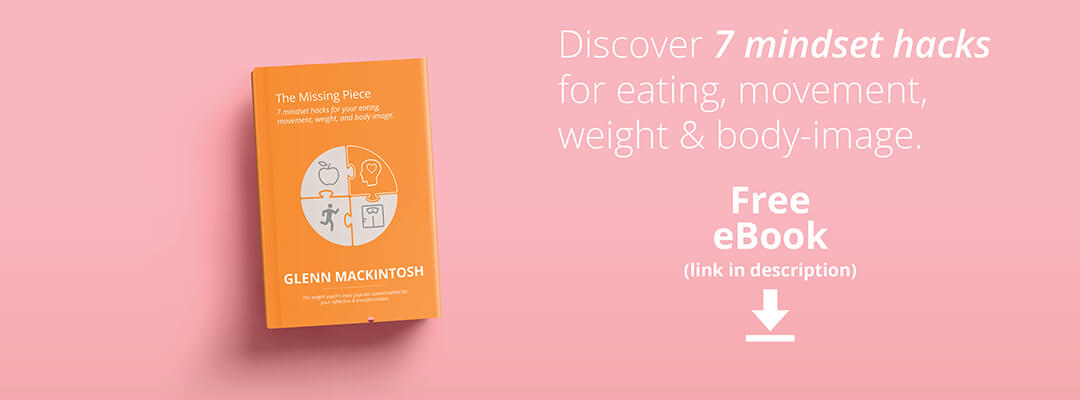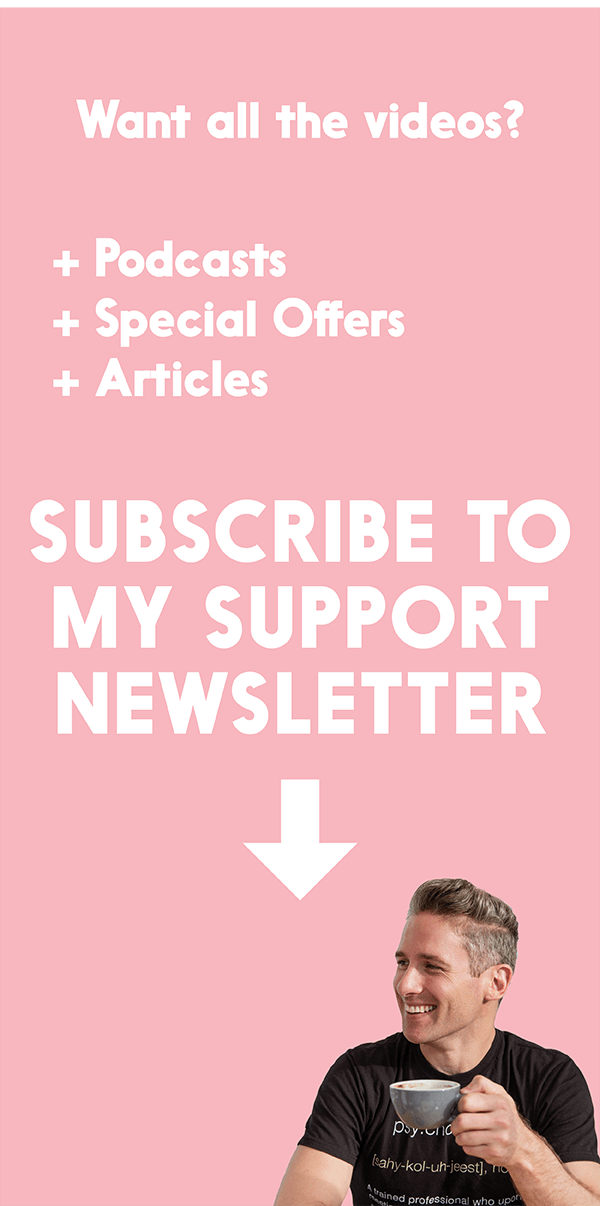
In this Thursday Therapy episode, The Weight Psych explains how your connection with to your mobile phone can be important for weight management, how you can become addicted to phones, and how to begin to set yourself free.
This episode features a shout out to superstar trainer and our good mate, Libby Babet and new trainer on The Biggest Loser: Transformed.
Watch Video
I created this video for people just like you.
If you found it valuable, please help me share it with them!
LINKS FROM VIDEO
SHOW NOTES
- Question from viewer on how to put her phone down and get off Facebook! [4:38]
- Mindfulness and phones. [5:02]
- Are you addicted to your phone? [6:05]
- Unplugging from “the Matrix”. [8:27]
- Creating phone free times. [8:51]
TRANSCRIPT
Hey everyone, it’s Glenn Mackintosh the weight psych and the question we’re answering today is about becoming too dependent on your mobile phone. So, guys, welcome to Thursday Therapy and thank you for all your feedback from the last Thursday Therapy, where I asked you what you wanted. So, what do we come up with? Firstly, you said that the session length was about the right time. I had wondered whether I was boring you but it appears that I’m not boring you for now, so that’s really good. What else? You wanted some health professional’s questions kept in. People actually really like the health professional’s questions. Some people said I’d like to see more of them. So, we’re going to try and get more of them, so if you are a health professional please ask us a question and what I’ll try to do is probably like alternate like a normal person and a health professional one for one. The other thing was that you still wanted us to move around in multiple places, so it’s cool that we’ve got the new office. This is our new office for our psychologists, Jason and Shana who just started up with us. Jason’s already started, clients are loving him. So, it’s really cool, but we get to use his office and we also got a new camera lens which will allow us to zoom in and zoom out and get some more little nooks and crannies for us to talk in. So that was cool. With regards to extra series, there was quite a few people that wanted to see some extra food and movement stuff from us, but we’re going to do that in an interesting way later on down the track, so we’ll shelve that idea and you can kind of watch this space. The other thing was, you know there were some people who are kind of interested in me and like a personal blog type thing, but probably not as many as we might have imagined. Which is, I think that’s actually really good because it means you’re kind of here for the work rather than me, which I think is actually more important, but I do understand that a lot of people want to get to know the person that they’re talking with a lot. So, if you head on over to our Instagram, I’m getting really good at posting on Instagram and little stories that you can see, and people are kind of saying this is actually a nice way to get to know another side of you. So, join our Instagram if you if you’re keen on that. The biggest thing by far is that people really wanted interviews. So, we’re going to do a series of interviews with some weight loss success stories, so you can learn about that. The pros and cons of what they did and what they didn’t do, of people who have kept some weight off for a fair period of time. So that’ll be really cool and we’re going to do some excellent interviews with some people who are doing great stuff in this space. So, if you do have any thoughts for people who you who you want to come and do interviews with us please let us have them, we’ve set a big dream list and I just talked to the first person and confirm them today. We’re going to get Libby Babet, who is probably Australia’s most talked-about trainer at the moment. She’s the new trainer on the transformed Biggest Loser, she’s the creator of buff girls which is an exercise movement just celebrating the positivity of women’s physical activity and she’s a good mate of mine. So really looking forward to having her and a whole bunch of people. If you have any great ideas on people you think that that I should talk to, let me know. But for now, let’s get to asking the question so Brenda asks, “Dear Glenn, I can’t put my phone down and get off Facebook is there a cure?” It’s a great question Brenda, I’m glad you asked this one and you might be thinking well what does this have to do with me managing my weight but I’m going to tell you why I wanted to answer this. The first thing is that I call these bad boys mindfulness suckers, if you’re connected to one of these then you might as well throw mindful eating out the window. You really can’t be scrolling through your social media and eat mindfully at the same time. The other thing is we do know that phone and Technology addiction is linked with mood issues like depression and anxiety and if you’re like a lot of people that I see that when you’re not feeling great it kind of throws your eating and your physical activity off-kilter then this could be really important for you. The other thing is at weight management psychology there’s this common theme of zooming out from just that number on the scales and looking at your holistic well-being as a whole person, so even if this really doesn’t have that much to do with your size or your weight or your shape it could be something that’s just really great to look at anyway. All of that said, let’s get to answering your question, Brenda. The first thing I want to talk to you about is the way you view your mobile phone use. I would encourage you to consider whether there is an addictive component to the way you connect with your phone, now, I’m not saying you’re necessarily addicted clinically but for a lot of people you have what we might call a subclinical addiction. It might not reach that level where it’s affecting your life for us to call it a mental health disorder but at the same time it really is affecting your general day-to-day well-being, so if we look at some of the factors of addiction what we find out withdrawals, so do you feel a bit uneasy when you don’t have access to your phone? I left my phone in my gym bag this morning and was kind of a bit like whoa whoa where is my phone for a little while it actually was part of the reason why I wanted to answer this question today, another thing that we find is you develop a tolerance so you need more of the phone to get the same satisfaction, so it might have been you know I used to check my facebook for five minutes a day now I check my Facebook for 45 minutes a day so you just get this increasing exposure you become more tolerant to it. So, it’d be interesting to ask yourself that as well. The third thing is that we get in addictions of persistent behaviour. The behaviour continues despite you recognizing that it’s not necessarily helpful even recognizing that it’s harmful, so if you’re like me and I’ve got to take a dose of my own medicine here sometimes look at your phone you find yourself kind of scrolling through thinking why am I doing this, then it’s possible that even if you’re not addicted that there is this addictive pathway going on in your brain. We definitely do see this happening, so that’s the sound of a text message going or the sight of seeing a message or the vibration of the phone telling you that someone’s calling can all become cues for that little hit of dopamine that little chemical that makes you go, oh, this feels good, this is a little bit exciting and I want more, so if you feel like you are addicted to your mobile phone you may want to get extra support. There are psychologists and support groups available that can help you with this but if it’s more of a, I just think I use my phone way too often, then I just want you to think of one really simple idea; creating phone three times so these times might be linked with a certain time of day like the brackets to your day are really good, you know, we do know there’s a lot of research to say that the first 30 minutes of the day having some type of a meditation or a meditative process of routine that you go through that sets you up for the day can be really good, so it can be good to have that time phone free and we also know at the other end of the day that if you’re getting all of these photons of light that are going into your eyes even if you’re really tired they’re kind of waking your brain up in a sense, so the last 30 minutes of every day can be really good to do phone free as well. You might like to link it to some type of a situation or an event in your life so for example I’ve been doing this myself for the past probably six to eight weeks or so and I’m really enjoying the benefits although I’ll be honest I’m not quite there yet but what I’m really enjoying is creating a movie time as a phone free time, so I’m not watching the movie and doing this and I’ve really enjoyed that it actually means that I’m thoroughly enjoying the movie and getting really engaged in that, that’s really important too for people who do a lot of emotional eating if you’re doing bored eating while you’re watching the TV, I would always say to my client watch something that really engages your brain, it’s very hard to get really engaged while you’re looking at two or three things at the same time. I really enjoyed doing it while I walk as well for me I’ll be honest walking by myself without a phone is really very hard to do. I like to take my phone and listen to music but what I’m doing is whenever I’m walking with someone I’ll just leave my phone at home, it really does help me be out there in the moment and I gotta say I noticed a lot of things that I probably wouldn’t notice otherwise, so you can link it to any type of event and of course a big one for us is going to be while you’re eating so guys I hope this was helpful for you and I wanted to give you one last tip before we finish, is that it might sound a bit pessimistic but I found this personally very helpful and a lot of my clients find it helpful, is to not trust yourself at the start and what I mean by that is rather than set yourself up for a potential failure and so I’m going to have the phone with me I just won’t check it, start off by controlling the environment and setting yourself up for success, so you might want to put your phone on charge in another room or you might want to give your phone to someone or I even know people that have found it really helpful to lock their phone away for periods of time and if you need to do that to unwire some of those connections in your brain that link your phone with every other cue then give yourself that time. So, guys thank you for paying attention to another Thursday Therapy. I hope you’ve enjoyed it. I think this one would be a really good one to share with people, it’s a really interesting topic when I told Emma what we were doing she said, I’m never watching that, I love my phone too much, and we can really get kind of addicted to these things and I spoke to dad who does a lot of our video work and he said, Glenn, everybody needs to listen to this, it’s really interesting, I remember being at the airport that a few weeks ago and I looked up and there might have been about 50 or 80 people around me all you know getting ready to board the various planes and I counted every single one of them was on the phone in some way apart from two and those guys were both on laptops, so it was just this real moment for me where I realized wow this is quite a thing and I think that times are changing you know we’re seeing hashtags like disconnect, unplug, GOMO for get out more often and I think we’re kind of at a version where people are starting to realize that while this you know the phones and the social media and that connectedness does offer us a lot of benefits there are also some significant drawbacks so we need to balance that, so it might be cool to share this with a friend or tag them and say, hey, you and I next time we go for a walk or we go to dinner or whatever else we’re doing we kind of leave our phones at home. Anyway, you have a mindful disconnected couple of weeks and I’ll see you at next Thursday Therapy.





